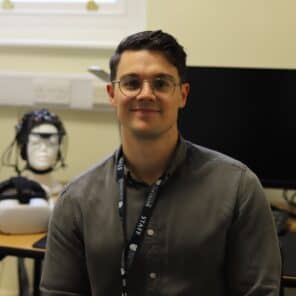4th
in the UK for Applied Psychology
National Student Survey 2025
Top 30
UK university out of
123 institutions
Guardian University Guide 2026
7th
in the UK for student satisfaction
in Psychology
Complete University Guide 2026
Overview
Discover the complexities of human behaviour and its implications for society
Our BSc (Hons) Criminology and Forensic Psychology degree goes beyond exploring why people commit crimes – it empowers you to understand how criminal behaviour generates evidence, informs court proceedings and shapes offender rehabilitation.
Whether you aspire to work directly in the criminal justice system or want to apply your skills in diverse sectors such as education, psychology, research, policy-making or healthcare, this degree provides a solid foundation to succeed.
Bridge the gap between psychology and criminology
Using cutting-edge research and real-world case studies, you will explore the intersections of psychological theory, criminal behaviour and societal responses. Examine how individuals engage in deviant behaviour, how crimes are investigated, and the judicial and legal processes that shape outcomes for offenders and victims alike.
This interdisciplinary approach equips you with adaptable skills, making this degree a stepping stone for careers in areas such as investigative psychology, victim advocacy, correctional program development or even human resource management, where understanding behaviour is crucial.
Gain a holistic view of crime’s ripple effects
Crime affects more than just those directly involved – it leaves psychological, social and economic impacts on victims, witnesses, offenders and communities.
This programme helps you examine these effects, fostering skills in empathy, critical thinking and policy evaluation that are vital in professions from social work to urban planning and corporate risk management.
You’ll explore how society can mitigate these effects through prevention strategies and rehabilitation initiatives, developing a forward-thinking perspective that is valued in diverse fields.
Master the tools to analyse, predict and address crime
Data is at the heart of understanding and addressing criminal behaviour. You will receive hands-on training in scientific methods, statistics and data analysis, helping you develop critical skills to interpret patterns, evaluate evidence and create data-driven solutions.
These transferable skills are in high demand across industries such as market research, cybersecurity and consultancy, where understanding human behaviour through data is key.
BPS-accredited course
Our BSc (Hons) Criminology and Forensic Psychology course is accredited by the British Psychological Society (BPS), which means you’ll graduate with an industry-recognised qualification that acts as a first step to becoming a psychologist.

National Student Survey 2023
Learning resources
Student voice
Mental wellbeing and communication
Explore a variety of psychology and criminology topics that include:
- Developmental psychology
- Mental health and forensic psychology
- Young people and crime
- Legal frameworks
- Human rights
- Diversity and duty of care
- Sexual offending.
Understand the place of psychology within the law and the criminal justice system
Throughout your degree you will gain an in-depth knowledge of the operations of the criminal justice system, and learn more about criminal law and the applications of forensic psychology within the judiciary system.
Learn from expert active researchers and ex-police staff
Our team of active researchers and experienced experts bring their knowledge and research directly into the classroom with them to ensure that you engage with the latest innovations and theories.
Small teaching groups for more personalised support
Our small, interactive seminars mean you are seen as an individual, not just another face in the crowd as our lecturers get to know you and how best to support your academic and personal development.
The Course
Develop your scientific knowledge and skills in the study of crime and forensic psychology
Year One
Your first year will introduce you to the foundations of criminology and forensic psychology. You will gain insights into the key issues and debates, consider how society manages crime and criminals and explore the broad concepts that underpin human rights, diversity and duty of care.
You’ll begin to gain the scientific and statistical skills required to conduct your own research and experiments.
Year Two
In the second year, you will examine the core British Psychological Society modules such as biological, cognitive and developmental psychology, as you broaden your understanding of aspects including legal frameworks and mental health and forensic psychology.
You will further your knowledge and skills in statistical data management, as well as the design and implementation of research experiments.
Year Three
In your final year, you will work to apply your acquired subject knowledge and research skills ahead of a final year project on a topic of your choice, as you also investigate young people and crime, and sexual offenders.
Criminology in Professional Practice module
Our careers-focused module in your third year introduces you to the real-world practice of criminology and gives you an idea of where you could apply your skills, as you explore jobs relating to criminology degrees.
Indicative modules
You will study a selection of core and optional modules in each year. Each module is worth a number of credits and is delivered differently depending on its content and focus of study.
Modules
Select a year
Social Minds: Exploring Human Interaction
The module will explore the experience of relationships through the processes related to forming an impression of people, feeling attracted or not to them, wanting to be their friend, getting to know them and forming a relationship with them, through a variety of behaviours, such as approaching them, talking to them, and meeting them socially.
Psychological theories and empirical findings from investigations into impression formation will be introduced, and methodology will be explored.
Thinking Like a Social Scientist: Study and Research Skills
This module will introduce you to research skills that are essential for your academic success and growth. It introduces you to the basics of data analysis and covers key concepts in time management and teamwork. You’ll develop your critical thinking skills to enhance your ability to present convincing arguments in written work, and your academic reading skills will also develop to enable you to access complex scientific reports.
Additionally, the module will teach you how to produce high-quality assessments, including creating references and citations using APA style, presenting information effectively, and writing well-structured essays.
Introduction to Criminology and Forensic Psychology
This module is aimed at introducing you to key topics in Criminology and Forensic Psychology, including theories of crime, categorisation of crime, criminal statistics, and the public response to crime.
The module will consider the meaning of and perspectives on crime. It will explore crime statistics and crime data. The module will include crime in several contexts, such as gender, youth, and race.
Facilitating Wellbeing: Positive Perspectives
Based on the discipline of Positive Psychology, the module will explore the experience of living well, relating the need to understand well-being, emotions, motivation, aspirations and goals to self-development, personality traits, needs for achievement, self-efficacy, and self-esteem, environmental influences and the enhancement of well-being.
Psychological theories and empirical findings from investigations into needs, motivation and traits will be introduced, as will the use of selected nonparametric statistics.
This module aims to give you an understanding of a broad area of everyday functioning and experience in terms of the behaviours, feelings, attitudes, and mental processes involved in that experience.
The module also aims to use functional analysis so that a broad experience can be broken down into a series of questions concerning the sub-functions and behaviours involved, allowing the psychological constructs and theories that are associated with those behaviours to be elucidated and explored. Exploration will involve appropriate methods to investigate what psychological constructs and theories relate to relevant behaviours and function.
The module will explore the experience of positive psychology relating the need to understand one’s own motivation, aspirations, and goals to self-development, personality, need for achievement, self-efficacy and self-esteem.
Psychological theories and empirical findings from investigations into emotions, traits and environments will be introduced and non-parametric methodology will be explored.
Mind and Machine
The module aims to develop an understanding of a broad area of everyday functioning and experience in terms of the behaviours, feelings, attitudes and mental processes involved in that experience.
You will use functional analysis so that a broad experience can be broken down into a series of questions concerning the sub-functions, psychological states and behaviours involved, allowing the psychological constructs and theories that are associated with those states and behaviours to be elucidated and explored.
Exploration will involve appropriate methods to investigate what psychological constructs and theories relate to relevant behaviours and function.
The Science of Behaviour: Theory to Evidence
This module introduces the conceptual and historical issues in psychology, as well as the work of prominent figures who have influenced the development of modern psychology. You will begin to explore key thinkers in psychology, focusing on how key thinkers design and conduct research in their field.
Human Cognition and Individual Differences
This module explores how we think (Cognitive Psychology) and how we differ from one another (Individual Differences).
The aim of this module is to introduce you to basic theory, research findings and methods of investigation in perception, attention, learning, memory, face and object recognition and problem-solving.
Developmental Psychology
Developmental Psychology involves the study of development and maturation in cognitive, personality and social processes.
The aim of this module is to introduce you to fundamental theory, research findings and methods of investigation in infancy, childhood, adolescence, adulthood and overall lifespan development.
The module will aim to provide a critical understanding of ways in which behaviour is influenced by developmental factors, the nature of developmental processes, and ways in which empirical research can help us to understand how developmental processes influence what we do.
Research Methods: Experimental Design and Analysis
The module aims to develop an understanding of experimental designs and associated methods of analysis related to psychology, and introduces you to research ethics. The introduced methods are variants of Analysis of Variance (ANOVA), a method that allows comparison of groups and/or conditions.
Biological Psychology
Biological Psychology involves the study of the biological and psychological bases of mind and behaviour.
This module will introduce you to basic theory, research findings and methods of investigation in behavioural genetics, neuroscience and neuropsychology.
The module will aim to provide a critical understanding of the ways in which behaviour is influenced by biological factors, how we study these biological processes and why these processes are important in applied psychological settings.
Legal and Forensic Psychology
In this module, you will have the opportunity to explore a comprehensive range of key constructs, theories, and research in mental health and forensic psychology.
We will examine the numerous ways that psychological research, methods, and expertise are applied to both the study of psychopathology and to issues that come before the legal system.
Different types of criminal law will be discussed, and case studies will be used to consider how these might be dealt with.
Research Methods: Survey & Qualitative Designs and Analysis
The module aims to develop an understanding of survey and qualitative designs and associated methods of analysis related to psychology.
The module will develop knowledge of survey and qualitative approaches to investigating and analysing psychological data. The relationship between correlational analysis and predictive reasoning will be outlined. Areas covered include multivariate analysis (multiple regression) and thematic analysis.
Independent Project
The Independent Project provides an opportunity to apply appropriate knowledge, concepts, techniques and research methods of psychology to an in-depth study of a particular question or problem related to psychology.
This module aims to foster a greater understanding of the processes involved in undertaking a research project and marks the culmination of your learning experience.
The study will enable you to produce a written research report, and a poster presenting a summary of your research and findings.
Project Management and Presentation Skills
This module enables you to deliver a wide range of skills, from project management to presentation of results in an accessible form.
In this module, you will have the opportunity to develop your project management skills, to further develop your scientific reasoning and reporting skills, and to learn skills necessary for producing a poster presenting research work.
Professional Skills in Clinical Settings
Professional Skills in Clinical Settings aims to put theory into practice. This module aims to introduce and explore important aspects in clinical settings and the role of the therapeutic relationship.
Interviewing skills in clinical settings will be explored in relation to the strengths and weaknesses of structured and semi-structured interview methods. You will gain experience of participating in a recorded interviewing session in the role of interviewer.
In this module, you will participate in a supervised administration of a standardised intelligence test that will give experience of and insight into psychological assessment typically conducted by child psychologists, educational psychologists, clinical psychologists and occupational psychologists.
Criminology in Professional Practice
This module aims to introduce you to the practice of ‘real-life’ criminology. It will equip you with an idea of where you could apply the skills learned in this degree. This module will aim to introduce you to the professional areas of practice that your degree might take you into.
Young People and Crime
To establish a firm understanding of crime in relation to young people, the crimes that they commit, profiling and crimes that are committed against them.
This module aims to give you an understanding of the role of the youth justice system and explore what efforts are made to reduce recidivism and promote restorative justice.
Teaching and Assessment
Feel the support of our expert and experienced staff
Smaller class sizes for better learning
You will build your subject knowledge and practical experience through lectures, workshops and tutorials in small classes, which means our expert teaching staff really get to know you and what support you need.
Learn more about our teaching staff
Benjamin T. Sharpe
Dr Benjamin Sharpe is a Senior Lecturer in Cognitive Psychology and Director of the Human Attention Laboratory at the University of Chichester, specialising in sustained attention, vigilance performance, and attention control across diverse populations including neurodivergent individuals, esports athletes, military personnel, and people living with dementia.
Moitree Banerjee
Moitree is the Head of School of Law, Business and Psychology and Reader in Clinical Psychology
Roy Spina
Roy completed his BSc in Psychology at University of British Columbia, before undertaking his MSc and PhD in Social and Personality psychology at Queen’s University (Canada), acquiring a strong background in research methodology and statistics, with an emphasis on quantitative experimental research.
In addition to being Academic Advisor and Research Degrees Co-ordinator, Dr Spina is the Research Lead for the department.
James Stiller
James has taught, developed, and led on a range of undergraduate and postgraduate psychology modules and courses.
James has a diverse range of research interests, including:
- Social network analysis and the evolution of social groups
- The connection between engaging with nature and wellbeing
- Visual perception
- Reading and maths comprehension in children
- Bullying behaviour in schools
Rachel King
Rachel leads several second-year modules in the Department, in addition to supervising extended project qualification and BSc dissertation projects.
Currently, Rachel is interested in the functional impact of prospective memory deficits and the potential of hyperthermic conditioning for slowing the progression of cognitive decline in Alzheimer’s disease.
She is also a graduate member of the British Psychological Society.
Michelle Cleveland
Michelle is a Senior Lecturer in Psychology at the Institute of Education, Social and Life Sciences.
Michelle has taught, developed, and led on a range of undergraduate modules and courses, including Organisational Psychology, Qualitative Research Methods, Social Psychology, and Applied Psychological Skills.
She is a Chartered Psychologist, a Chartered Scientist, an Associate Fellow of the British Psychological Society as well as a Fellow of the Higher Education Academy.
Contact Time
Each module has three hours of contact time per week and includes lectures, seminars and workshops.
Assessments
You will be assessed through a range of assignments, including:
- Scientific reports
- Essays
- Group and individual presentations
- Poster design
- Multiple choice papers
- Short answer papers
- Research participation
- Essay exams.
Experience
Discover our range of specialist research equipment and facilities
Brain Imaging Unit and Neuroimaging: NIRScout
Our neuroimaging system with a 3D scalable ultra-high-density near-infrared spectroscopy platform measures changes in the cerebral cortex using NIRScout and NIRx Medical Technologies.
Eye tracking software
Our specialist eye tracking software allows you to track shifts in visual attention and can be used for attentional retraining purposes.
Virtual Reality Unit and Immersive Suite
Suite including an affective immersive emotional Virtual Reality stimuli package that allows researchers to create different worlds for Neuroscience Research using aLIAS and Vizard.
Specialist Advanced Research Software
Software for measuring and manipulating a broad range of psychological constructs; Inquisit, Qualtrics, Noldus Observer XT, E-prime, Superlab and Nvivo.
Advanced Physiological Data Acquisition system
Our specialist advanced data acquisition system allows you to measure physiological activity from the brain, heart and motor neuron pathways with Biopac software.
Learning Resource Centre
The Learning Resource Centre (LRC) contains the library, a café, IT/teaching rooms and the Support and Information Zone (SIZ).
Library
Our campus library holds more than 200,000 books and over 500,000 eBooks.
Kasia
Study Abroad
Explore the opportunity to study part of your course abroad
As a student at the University of Chichester, you can explore opportunities to study abroad during your studies to enrich your educational experiences.
It’s a chance to broaden your horizons, a great opportunity to meet new people, undertake further travelling and to immerse yourself within a new culture.
You will be fully supported throughout the process to help find the right destination and institution for you and your course. We can take you through everything that you will need to consider, from visas to financial support, to ensure you get the best out of your time studying abroad.
Careers
Where you could go after your studies
Careers as Criminologists or Forensic Psychologists
This degree could prepare you for a career as a Forensic Criminologist or a Forensic Psychologist. These roles have a lot of overlap but are different.
Both roles can both work in the prison service, rehabilitation units, secure hospitals, courts and in social services.
Criminologist
A criminologist will focus on societal or sociological factors that underpin criminal behaviours, particularly the factors that could lead people to committing crimes. They will explore the impact of crime on victims and work with victims to help them cope and return to normalcy.
They will also work with criminal justice system professionals on subjects such as implementing policy and procedural changes to benefit criminals and victims of crime.
Forensic psychologist
Forensic psychologists will focus more on developing, testing and implementing treatment programmes for criminals to reduce reconvictions. They also examine the techniques they can use to develop, pilot and implement treatment programmes to modify offending behaviours.
Forensic psychologists can give evidence in court and undertake statistical analyses to look at offender and prisoner profiling.
Graduate with basis for chartership with the BPS
To become a Forensic Criminologist or Psychologist, you will need to register with the British Psychological Society (BPS).
This degree offers you the graduate basis for chartership with the BPS, and you would go on to complete a BPS-accredited MSc Forensic Psychology qualification to prepare to take the doctoral level Stage 2 BPS qualification.
Gain the skills and knowledge employers want
Our BSc (Hons) Criminology and Forensic Psychology provides you with practical, analytical and technical skills and knowledge that are highly sought-after across a range of industries.
Other career options include:
- Police work
- Probation service
- Victim or offender support
- Teaching
- Social welfare
- IT or computing
- Data analysis
- Human resources
- Market, government or social research
- Civil service.
Course Costs
Course Fees 2026/27
UK fee
International fee
EU/EEA Fee Reduction Scholarship
EU/EEA students automatically pay the equivalent of UK fees via the EU/EEA Fee Reduction Scholarship
For further details about fees, please see our Tuition Fee page.
For further details about international scholarships, please see our Scholarships page.
To find out about any additional costs on this course, please see our Additional Costs page.
Entry Requirements
Typical offers (individual offers may vary):
UCAS
A Levels
BTEC/Cambridge Technical
Access to HE Diploma
IB
IELTS
Contextual offers
We believe everyone deserves an equal opportunity to pursue higher education, regardless of their background.
When we receive your application we consider your personal circumstances and the factors surrounding your achievements to see if you are eligible for a contextual offer. This is an offer with a reduced entry tariff – typically the equivalent of 16 fewer UCAS points (two A-level grades).
Applicants who are predicted to achieve two or more (A-level) grades better than the published typical offer will normally be made the typical offer, rather than a reduced offer. For example, where the predicted grades are BBB, and the published typical offer is BCC, a BCC offer would be made.
Find out more about our contextual offers.
Are you interested in this course and would like to learn more? Please email Professor Esther Burkitt on e.burkitt@chi.ac.uk for admissions queries.










